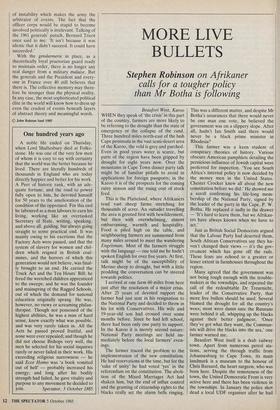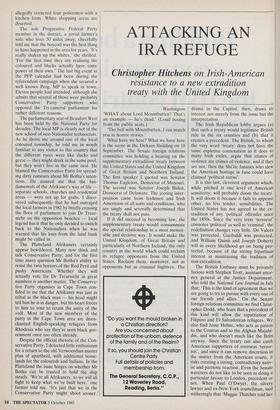MORE LIVE BULLETS
Stephen Robinson on Afrikaner
calls for a tougher policy than Mr Botha is following
Beaufort West, Karoo WHEN they speak of 'the crisis' in this part of the country, farmers are more likely to be referring to the drought than the state of emergency or the collapse of the rand. Three hundred miles north-east of the lush Cape peninsula in the vast semi-desert area of the Karoo, the veld is grey and parched. Even in good years water is scarce, but parts of the region have been gripped by drought for eight years now. Over the mountains in Cape Town dinner party talk might be of familiar pitfalls to avoid in applications for foreign passports; in the Karoo it is of the prospects for the coming rainy season and the rising cost of stock feed.
This is the Platteland, where Afrikaners tend vast sheep farms stretching for thousands of acres. An outsider travelling the area is greeted first with bewilderment, but then with overwhelming, almost embarrassing, warmth and hospitality. Food is piled high on the table, and neighbouring farmers are summoned from many miles around to meet the wandering Engelsman. Most of the farmers struggle with the language — one told me he hadn't spoken English for over five years. At first, talk might be of the susceptibility of Merino sheep to drought, but with a little prodding the conversation can be steered towards politics.
I arrived at one farm 60 miles from here just after the resolution of a major crisis. After 25 years of devoted support the farmer had just sent in his resignation to the National Party and decided to throw in his lot with Conservatives. His wife and 19-year-old son had crossed over some months before. Since he had left school, there had been only one party to support. In the Karoo it is merely second nature: National Party meetings are held im- mediately before the local farmers' even- ings.
The farmer traced the problem to the implementation of the new constitution. He had reservations at the time, but for the `sake of unity' he had voted 'yes' in the referendum on the constitution. The aboli- tion of the Mixed Marriages Act had shaken him, but the end of influx control and the granting of citizenship rights to the blacks really set the alarm bells ringing. This was a different matter, and despite Mr Botha's assurances that there would never be one man one vote, he believed the government was on a slippery slope. After all, hadn't Ian Smith said there would never be a black prime minister in Rhodesia?
This farmer was a keen student of conspiracy theories of history. Various obscure American pamphlets detailing the pernicious influence of Jewish capital were proferred for inspection. 'You see South Africa's internal policy is now decided by the money men in the United States. Chester Crocker knew all about the new constitution before we did.' He showed me a scroll confirming his life-long mem- bership of the National Party, signed by the leader of the party in the Cape, P. W. Botha. He replaced it sadly in the drawer — 'It's hard to leave them, but we Afrikan- ers have always known when we have to act.'
Just as British Social Democrats argued that the Labour Party had deserted them, South African Conservatives say they ha- ven't changed their views — it's the gov- ernment which has gone off the rails. These fears are echoed to a greater or lesser extent in farmhouses throughout the region.
Many agreed that the government was not being tough enough with the trouble- makers in the townships, and repeated the call of the redoubtable Dr Treurnicht, leader of the Conservative Party, that more live bullets should be used. Several blamed the drought for all the country's woes; most were damn sure the Russians were behind it all, whipping up the blacks against their better judgment. 'Once they've got what they want, the Commun- ists will drive the blacks into the sea,' one farmer warned me.
Beaufort West itself is a drab railway town. Apart from numerous petrol sta- tions, serving the through traffic from Johannesburg to Cape Town, its main landmark is a museum to the honour of Chris Barnard, the heart surgeon, who was born here. Despite the remoteness of the town, the United Democratic Front is very active here and there has been violence in the townships. In January the police shot dead a local UDF organiser after he had
allegedly cornered four policemen with a kitchen form. White shopping areas are deserted.
The sole Progressive Federal Party member in the district, a jovial farmer's wife who lives 50 miles away, cheerfully told me that the boycott was the best thing to have happened in the area for years. 'It's really shaken up the whites,' she shrilled. `For the first time they are realising the coloured and blacks actually have some power of their own.' The last big event in the PFP calendar had been during the referendum campaign when she secured a well known Prog. MP to speak in town. Eleven people had attended, although she admits that several of those were probably Conservative Party supporters who opposed the Tri-cameral parliament for rather different reasons.
The parliamentary seat of Beaufort West has been held by the National Party for decades. The local MP is clearly not of the new school of neo-Nationalist technocrats. As he drove me around one of the local coloured township, he told me in words familiar to any visitor to this country that the different races were like ducks and geese — they might drink in the same pool, but they won't live in the same nest. He blamed the Conservative Party for spread- ing dirty rumours about Mr Botha's inten- tions. He assured me that the fun- damentals of the Afrikaner's way of life separate schools, churches and residential areas — were not up for grabs. I disco- vered subsequently that he had outraged the local farmers in 1982 by briefly crossing the floor of parliament to join Dr Treur- nicht on the opposition benches — local legend has it that he only decided to switch back to the Nationalists when he was warned that his loan from the land bank might be called in.
The Platteland Afrikaners certainly appear bewildered. Many now think and talk Conservative Party; and for the first time many question Mr Botha's ability to resist the twin horrors of the Red Peril and pushy Americans. Whether they will actually vote for Dr Treurnicht in great numbers is another matter. The Conserva- tive Party organiser in Cape Town con- fided to me that the Afrikaner was just as tribal as the black man — his head might tell him he is in danger, but his heart forces to him to vote to retain the unity of the yolk. Most of the new members of the party in the Cape Town area are disen- chanted English-speaking refugees from Rhodesia who say they're seen black gov- ernment once too often already.
Despite the official rhetoric of the Con- servative Party, I detected little enthusiasm for a return to the old Verwoerdian master plan of apartheid, with additional home- lands for the coloureds and Indians. In the Platteland the issue hinges on whether Mr Botha can be trusted to hold the ship steady. 'We're all Afrikaners, so we will all fight to keep what we've built here,' one farmer told me. 'It's just that we in the Conservative Party might shoot sooner.'



























































 Previous page
Previous page